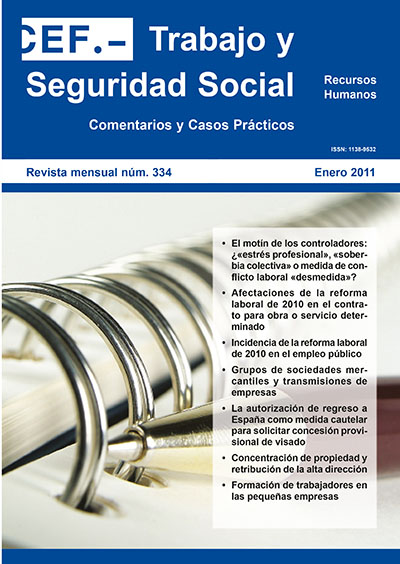Afectaciones de la reforma laboral de 2010 en el contrato para obra o servicio determinado
DOI:
https://doi.org/10.51302/rtss.2011.5209Palabras clave:
reforma laboral, contratación temporal, duración del contrato, indemnización, encadenamiento de contratos temporalesResumen
Una de las principales finalidades declaradas de la reforma laboral de 2010 ha sido la voluntad de recuperar la senda de la creación de empleo y reducir el desempleo en España. De todas las medidas adoptadas por la reforma laboral para la consecución de este objetivo cabe destacar aquellas dirigidas a la reducción de la dualidad del mercado laboral y, en particular, a la restricción del actualmente desmesurado recurso a la contratación temporal. Entre estas medidas, primero el Preámbulo del Real Decreto-Ley 10/2010, de 16 de junio, de medidas urgentes para la reforma del mercado de trabajo, y después el Preámbulo de la Ley 35/2010, de 17 de septiembre, de medidas urgentes para la reforma del mercado de trabajo, destacan las siguientes: a) las medidas dirigidas a establecer un límite temporal máximo en los contratos para obra o servicio determinado, límite a partir del cual ha de considerarse que las tareas contratadas tienen naturaleza permanente y han de ser objeto de una contratación indefinida; b) las medidas que introducen algunos ajustes en la regla instaurada en 2006 para evitar el encadenamiento sucesivo de contratos temporales, a fin de hacerla más eficiente; y, finalmente, c) las medidas consistentes en incrementar la indemnización por finalización de determinados contratos temporales.
Precisamente, el presente trabajo se dedica al estudio de cómo estas medidas introducidas en la reforma laboral inciden en la modalidad del contrato para obra o servicio determinado, no en vano, resulta evidente que cualquier actuación normativa que tenga por finalidad restringir el uso injustificado de las modalidades temporales de contratación debe incidir en esta modalidad contractual, por ser esta la más utilizada entre las modalidades de contratación temporales y aquella que plantea mayores dudas respecto al carácter justificado o no de su utilización. La mayor parte del estudio que se realiza, sin embargo, también resulta de aplicación a otras modalidades contractuales de carácter temporal, especialmente, al contrato eventual, que constituye la otra modalidad contractual temporal de mayor utilización. No en vano, a pesar de que la reforma laboral de un modo sorprendente no ha incidido específicamente en esta modalidad contractual, la misma se ha visto afectada por aquellas disposiciones introducidas por la reforma que son comunes a las diferentes modalidades de contratación temporal, a saber, los ajustes introducidos en la regla instaurada para evitar el encadenamiento sucesivo de contratos temporales y el incremento de la indemnización por finalización de determinados contratos temporales.
Agencias de apoyo
Este trabajo se enmarca en el proyecto de investigación SEJ 2007-67808-C02-01 concedido por el Ministerio de Ciencia e Innovación, que lleva el título de «Delimitación subjetiva y condiciones de empleo y de trabajo del personal docente e investigador (PDI) de las Universidades Públicas



















